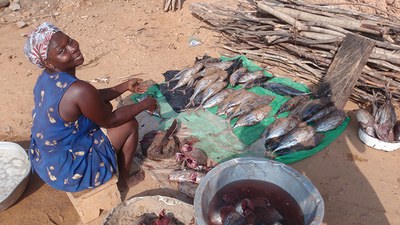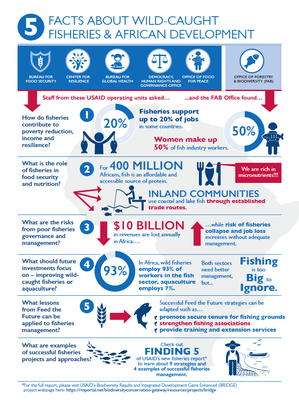USAID's Food For Peace Explores the Role of Wild-Caught Fisheries

As USAID’s Office of Food For Peace (FFP) and their partners respond to humanitarian crises around the world, what is the role of wild-caught fisheries in achieving FFP’s food security, nutrition and resilience goals?
To answer this question, FFP and the E3 Office of Forestry and Biodiversity (E3/FAB) jointly organized a workshop to review the importance and contributions of wild-caught fisheries to FFP’s goals, and to discuss the opportunities and challenges for addressing wild-caught fisheries management through FFP programs.
Dr. Adam Reinhart started with an overview of FFP’s Strengthening Capacity in Agriculture, Livelihoods and Environment (SCALE) activity which focuses on improving the impact, sustainability and scalability of FFP emergency and development programming in agriculture, sustainable livelihoods and natural resource management. Next, Dr. Barbara Best presented findings from a new USAID E3/FAB report, The Role of Wild-Caught Fisheries in African Development, including background information on the important contributions of wild-caught fisheries in Africa. Dr. Brian Crawford of the University of Rhode Island and Dr. Courtney Cox of Rare then shared their experiences working with fishing communities in Ghana, Malawi and Mozambique. The workshop also provided an opportunity for fisheries experts from environmental organizations to present practical tools and methodologies that they have applied to successfully manage wild-caught fisheries.
Some of the contributions of wild-caught fisheries in Africa that were highlighted include:
- Fish is a highly nutritious food that contributes to food security and livelihoods for over 400 million Africans in both inland and coastal areas;
- Wild-caught fisheries support livelihoods for millions of people and well-managed fisheries can alleviate poverty, strengthen resilience and serve as a valuable component in a diversified food security strategy in many African countries;
- Marine and freshwater fisheries in Africa employ 93% of people in the fish production sector, and aquaculture employs the remaining 7%;
- Half of the workers in the seafood industry are women, mainly in post-harvest activities;
- Marine and freshwater fish are traded through informal trade routes to communities hundreds of miles away from their source and thus may contribute to inland Feed the Future Zones of Influence; and
- According to the World Bank, Africa is losing an estimated $10 billion in economic benefits each year due to inadequate management of their fisheries.
Despite their critically important contributions to development, Africa’s wild-caught fisheries are at risk of decline, decreased productivity and collapse due to poor management. There is an urgent need to reform and improve wild-caught fisheries management using proven strategies such as promoting policies that secure tenure and access to fishing grounds for small-scale fishers, strengthening fisher associations and using proven ecosystem-based management approaches. Improving the status of wild-caught fisheries in Africa can play a critical role in achieving FFP’s long-term goals of advancing food security, nutrition and resilience through sustainable approaches.
Workshop participants included USAID staff from FFP, E3/FAB and Bureau of Africa; FFP implementers such as ACDI/VOCA, Catholic Relief Service, Cultivating New Frontiers in Agriculture, Food For the Hungry, Global Food and Nutrition, Mercy Corps, Save the Children and World Vision; and fisheries experts from the University of Rhode Island, Rare, Conservation International, Environmental Defense Fund, The Nature Conservancy, Wildlife Conservation Society and World Wildlife Fund.



